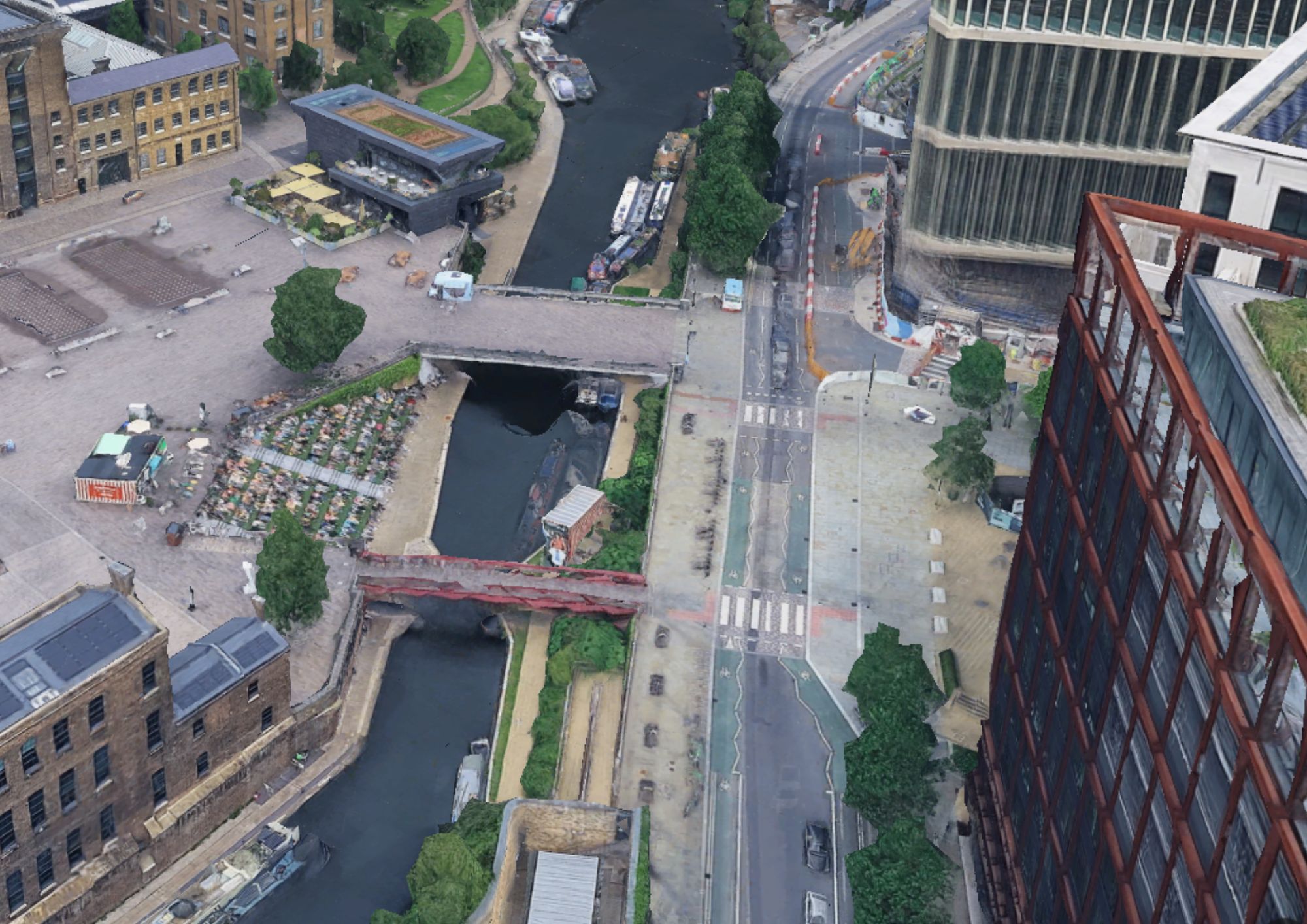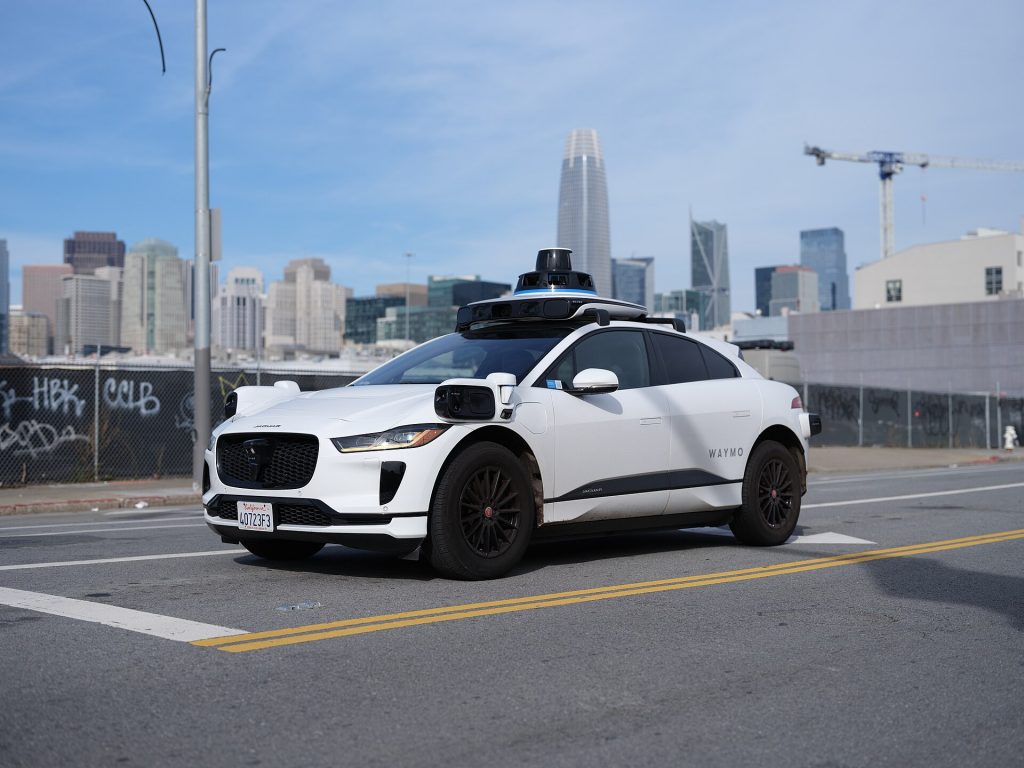Driverless cars? Let’s see them take on Goods Way, say black cab drivers
New service is due to launch in London next year – but taxi drivers say it will cause chaos at crossings
Monday, 17th November 2025 — By Richard Osley

The two pedestrian crossings next to each in King’s Cross that cab drivers hate
CABBIES have been warned that “driverless cars” could soon take their jobs in London with the arrival of a robot operator from the United States.
Waymo, which runs an autonomous service in five American cities, is due to launch a trial at the start of next year and has talked about quickly scaling up its offer.
Black cab drivers, however, have predicted chaos, and sceptics are using two crossings in King’s Cross to forecast disaster if the so-called “robo-taxis” take over.
Although on paper it may look like a quick route, drivers in the know avoid Goods Way – the road linking the forest of tech offices on the railway lands to Granary Square and Coal Drops Yard – at peak times because of a never-ending trail of pedestrians.
Just as they think they can edge over the zebra crossing, more people step on.
A driverless car using radars to know when to move, it was suggested this week, would get stuck there permanently.
Steve Kenton, a black cab driver and columnist for the Licensed Taxi Drivers Association, said: “Forget signal issues or driving the wrong way up a one-way street – the moment somebody steps onto the road within the proximity of the vehicle’s sensors, it will stop, as it should.
“Now add in the effect that some crossing points across London will have on the vehicle, and you’ll see more movement on Quincy M.E.’s mortuary slab than some of these vehicles being able to clear a crossing.
“Goods Way springs to mind. Add in the drug deals, sexual dalliances, and bodily fluids that may be present in the vehicle and it will be the height of luxury if you’re used to low-rent, low-skilled travel.”

A Waymo-operated Jaguar I-Pace in San Francisco, 2023. This model was recalled after a crash into a pole [Dllu]
The debate over how far our roads may change with the introduction of driverless cars has been bubbling up as part of the broader discussion about whether the rise of artificial intelligence will lead to mass unemployment.
It has been predicted in some quarters that the majority of all road trips in the UK could be “driverless” by 2040 to 2050 – with the hope that road deaths and even drink-driving could be eliminated.
Elon Musk, the world’s richest man, has been at the centre of the development with his luxury car firm Tesla.
Waymo’s private-hire cars are controlled by what are officially called “trained human specialists”.
In broad terms, the new vehicles use laser sensors to measure the world around them and map other objects and cars, as well as tracking weather.
London will be the first European city with a service of this kind, pending final approval from the government and Transport for London.
Tekedra Mawakana, chief executive at Waymo, which is part of the same organisation as Google, said the new technology would make “roads safer and transportation more accessible”.
The company said it had completed 10,000,000 fully automated journeys in the United States in May alone.
But Mr Kenton, writing in his monthly column for Taxi magazine, said that at the example of Goods Way there were “two perpetually busy pedestrian crossings bringing traffic to a standstill throughout the day”, and asked: “What action will an autonomous private hire vehicle take to alleviate the problems it faces at that location?”
He said: “Technology simply cannot replicate the Knowledge – or even basic, local knowledge for that matter – and a driver’s ability to think outside the box.”
Steve McNamara, general secretary of the LTDA, told the Guardian last month that the service would be “a fairground ride”, adding: “It’s a tourist attraction in San Francisco. Quite frequently one of them will lock up in the middle of a junction because it gets confused and the police have to come and park, wait for the Waymo man to get his laptop out, and get it going again.”
…but they are worried that not enough want to do Knowledge
WHILE black cab drivers in London may be sceptical about the threat from driverless cars, they are concerned at an apparent lack of interest in joining the trade among young people.
Anthony Street, an executive at the Licensed Taxi Drivers Association, warned this week that “an ageing workforce means more drivers are retiring or leaving without being replaced.”
He added: “Fewer people are signing up to do The Knowledge – the essential gateway into our profession.
“If this trend continues, we won’t have enough drivers to meet future demand. The danger is that passengers will simply turn to other transport options, and the proud legacy of the black cab could fade into history.”
The Knowledge is the mental map that all black cab drivers can call upon to provide a quick route from one spot in London to another.
Drivers have talked about getting onto TikTok and other channels to show off the profession.
Portrayals in film and TV – such as Matt Lucas’s gold-toothed chatterbox in the Paddington film – often simply play on the clichés of a stereotype London driver.
Mr Street said “new blood” was needed in the industry to keep it going, adding: “Some may disagree, but this isn’t about short-term numbers – it’s about where we will be in five, 10, or even 20 years’ time.”
The LTDA is attending school leavers exhibitions this month to help promote black cab driving as a career option.